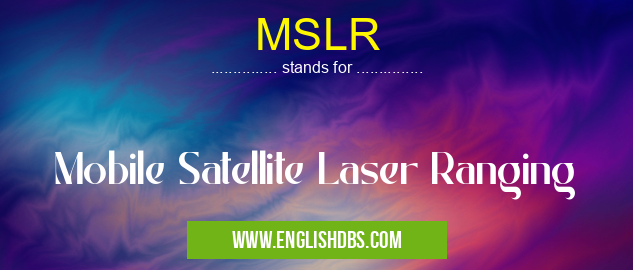What does MSLR mean in MOBILE
MSLR (Mobile Satellite Laser Ranging) is a state-of-the-art technology used in geodesy and precise orbit determination (POD). It involves mounting a laser ranging system on a mobile platform, such as a truck or aircraft, to measure the distance between the platform and multiple satellites simultaneously.

MSLR meaning in Mobile in Computing
MSLR mostly used in an acronym Mobile in Category Computing that means Mobile Satellite Laser Ranging
Shorthand: MSLR,
Full Form: Mobile Satellite Laser Ranging
For more information of "Mobile Satellite Laser Ranging", see the section below.
How MSLR Works
MSLR operates on the principle of laser ranging. A laser beam is emitted from the mobile platform towards a target satellite. The satellite reflects the beam back to the platform, and the elapsed time is measured. This time measurement, along with the precise position and attitude of the platform, allows for the calculation of the distance between the platform and the satellite.
Applications of MSLR
MSLR technology has numerous applications in space geodesy and satellite navigation:
- Precise Orbit Determination (POD): MSLR provides highly accurate measurements for determining the orbits of satellites, which is crucial for precise navigation and satellite positioning.
- Geoid Determination: MSLR data contributes to the determination of the Earth's geoid, the shape of the Earth's gravity field.
- Tectonic Plate Motion Studies: MSLR measurements can detect changes in the positions of tectonic plates over time, aiding in the study of plate tectonics.
- Satellite Collision Avoidance: MSLR can provide early warning of potential satellite collisions by tracking the trajectories of satellites.
Advantages of MSLR
- Mobility: The mobile platform allows for measurements from different locations, increasing the coverage and accuracy of data.
- Simultaneous Measurements: MSLR can measure the distance to multiple satellites simultaneously, providing a comprehensive dataset for orbit determination.
- High Accuracy: MSLR systems can achieve accuracies of a few millimeters, making them valuable for precise measurements.
Essential Questions and Answers on Mobile Satellite Laser Ranging in "COMPUTING»MOBILE"
What is Mobile Satellite Laser Ranging (MSLR)?
MSLR is a technique used to determine the precise distance between a satellite and a ground-based station using laser pulses. It involves firing laser beams from a mobile ground station towards orbiting satellites and measuring the time it takes for the reflected pulses to return.
What are the applications of MSLR?
MSLR has numerous applications, including:
- Accurately tracking the positions of satellites in orbit, which is crucial for satellite navigation systems.
- Monitoring the Earth's gravity field and detecting changes over time.
- Studying the Earth's rotation and its variations.
- Measuring the distance to the Moon with high precision.
How does MSLR differ from traditional laser ranging techniques?
Unlike traditional laser ranging systems that are fixed in one location, MSLR utilizes mobile ground stations. This allows for the collection of data from various locations, providing a more comprehensive view of the satellite's orbit and the Earth's gravity field.
What are the advantages of using MSLR?
MSLR offers several advantages, such as:
- Enhanced accuracy and precision in satellite positioning.
- Improved understanding of the Earth's gravity field and its variations.
- Detection of subtle changes in the Earth's rotation and its impact on global processes.
How is MSLR data processed and analyzed?
MSLR data is processed through complex algorithms to:
- Extract the time-of-flight information from the laser pulses.
- Correct for atmospheric and instrumental effects.
- Determine the satellite's position and velocity with high precision.
- Analyze the gravity field variations and rotation parameters of the Earth.
Final Words: MSLR technology plays a vital role in geodesy and satellite navigation by providing precise distance measurements between mobile platforms and orbiting satellites. Its applications range from orbit determination to geoid mapping, tectonic plate studies, and satellite collision avoidance. As MSLR systems continue to advance, they will continue to enhance our understanding of the Earth and space and support various applications in the future.
